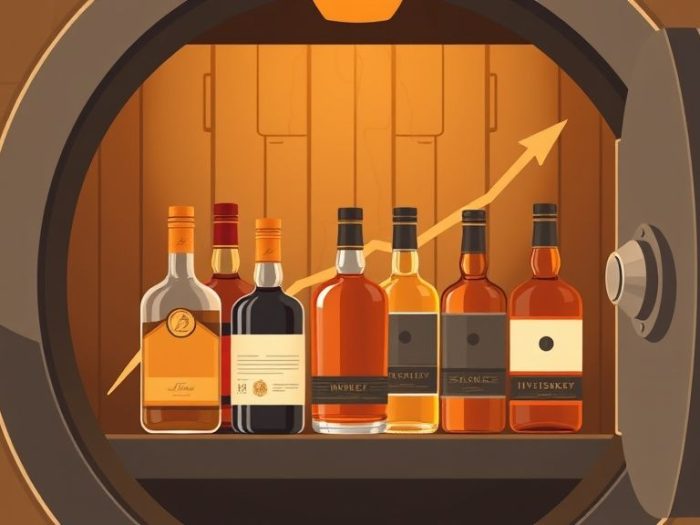Investing in collectible whiskey and other fine spirits has become a growing trend, offering
potential for both enjoyment and financial returns. This guide explores the world of spirits
investing, covering key factors, strategies, and risks.
Understanding Collectible Spirits
Collectible spirits are high-quality, often rare, and limited-edition alcoholic beverages that
can appreciate in value over time.
Types of Collectible Spirits
- Whiskey: Scotch, bourbon, rye, and other styles.
- Cognac: A type of brandy produced in the Cognac region of France.
- Rum: Aged rums from specific distilleries or regions.
- Tequila: High-end, aged tequilas.
Factors Influencing Value
Several factors determine the value of collectible spirits:
- Age: Older spirits, especially those from closed distilleries, can be highly valuable.
- Rarity: Limited production runs or special editions increase rarity.
- Distillery/Producer: Renowned distilleries with a history of quality.
- Vintage: The year the spirit was distilled.
- Condition: Proper storage and preservation are crucial.
- Demand: Collector interest and market trends.
Strategies for Investing in Collectible Spirits
1. Focus on Reputable Distilleries/Producers
Prioritize spirits from distilleries or producers with a strong track record of quality and
consistent demand.
2. Seek Limited Editions and Rare Releases
Bottles with limited production numbers or special releases tend to appreciate more.
3. Understand Aging Potential
Certain spirits, like whiskey and cognac, can improve with age in the bottle, increasing their
value.
4. Proper Storage
Invest in proper storage conditions to preserve the quality of the spirit:
- Temperature control
- Humidity control
- Darkness
- Upright storage (for spirits, not wine)
5. Purchase from Reputable Sources
Buy from established retailers, auction houses, or directly from distilleries to ensure
authenticity.
6. Consider Professional Advice
Consult with a spirits expert or advisor for guidance.
Potential Returns and Time Horizon
Returns on spirits investments can vary significantly. Some bottles appreciate rapidly, while
others may take longer. This is generally a medium to long-term investment, with optimal
returns often realized over 5-10 years or more.
Risks of Spirits Investing
- Market Volatility: Prices can fluctuate based on collector demand and economic conditions.
- Storage Risks: Improper storage can damage the spirit and decrease its value.
- Counterfeits: The market has a risk of counterfeit bottles.
- Liquidity: Selling rare spirits can take time.
- Changing Tastes: Consumer preferences can shift.
Conclusion
Investing in collectible spirits can be a rewarding endeavor for those passionate about fine
beverages and willing to conduct thorough research. However, it’s essential to understand the
risks and approach it with careful planning and a long-term perspective.
Related Keywords
Whiskey investing, fine spirits investment, collectible whiskey, rare whiskey, bourbon
investment, cognac investment, spirits market, whiskey collecting, liquor investing,
alternative investments.
Frequently Asked Questions (FAQ)
1. What are collectible spirits?
Collectible spirits are high-quality, often rare, and limited-edition alcoholic
beverages that can appreciate in value over time.
2. What are some types of collectible spirits?
Examples include whiskey, cognac, rum, and tequila.
3. What factors influence the value of collectible spirits?
Factors include age, rarity, distillery/producer, vintage, condition, and demand.
4. Why are first editions important in spirits collecting?
While the term “first edition” isn’t strictly applicable to spirits, the equivalent is
early releases or bottlings, which can be highly sought after.
5. How does the age of a spirit affect its value?
Older spirits, especially those from closed distilleries or with long aging periods,
can be more valuable.
6. What is the role of proper storage in spirits investing?
Proper storage is crucial to preserve the quality and value of the spirit.
Temperature, humidity, light, and storage orientation (for wine, not spirits) are
important.
7. What are the potential returns from investing in collectible spirits?
Returns can vary significantly, and while high returns are possible, they are not
guaranteed.
8. What are the risks of spirits investing?
Risks include market volatility, storage risks, the possibility of counterfeits,
and limited liquidity.
9. Is spirits investing a short-term or long-term strategy?
Spirits investing is generally a medium to long-term strategy, with optimal
returns often realized over several years.
10. Do I need to be a spirits expert to invest?
While not strictly required, some level of knowledge and research is beneficial.
Consulting with experts is often recommended.



